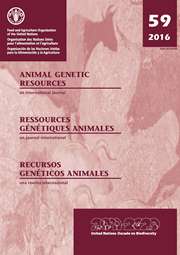The Sixth Session of the Intergovernmental Technical Working Group on Animal Genetic Resources for Food and AgricultureFootnote 1 took place in Rome in November 2010. The agenda items included the status of implementation of the Funding StrategyFootnote 2 of the Global Plan of Action for Animal Genetic Resources. The Working Group stressed the need for adequate funding to support developing-country implementation of the Global Plan of Action. It recommended that the Commission on Genetic Resources for Food and Agriculture request FAO to announce the first call for proposals for use of the FAO Trust Account established under the Funding Strategy when it has reached a threshold of around US$500 000. It further recommended that the Commission agree to a maximum of one concept note from each developing country and country with economy in transition in the first call, with an initial maximum of up to US$50 000 per project. It stressed that bilateral or multilateral project proposals should be encouraged. Project proposals will be submitted by governments, but other stakeholders may wish to take the opportunity to draw attention to relevant opportunities for projects in their respective countries and collaborate in the development of proposals.
The Working Group reviewed draft guidelines prepared by FAO on phenotypic characterizationFootnote 3, molecular genetic characterizationFootnote 4, cryoconservationFootnote 5, surveying and monitoringFootnote 6, and development of the institutional framework for the management of animal genetic resourcesFootnote 7. It recommended that the Commission endorse the draft guidelines and request FAO to finalize and publish them and encourage countries to make full use of them.
In reviewing the status of FAO's work on the implementation of the Global Plan of Action, the Working Group noted the importance of the forthcoming reports on the progress made by countries and international organizations in implementing the Global Plan of Action. A survey of international organizations’ activities was undertaken by FAO early in 2011 via an internet-based questionnaire. Later in the year, countries will be asked to complete questionnaires on their activities. This will be a key opportunity to obtain an overview of how implementation of the Global Plan of Action is progressing. Stakeholders should help ensure that implementation activities in their countries are fully reflected in the questionnaire responses submitted by their respective governments.
Also on the agenda of the Working Group was the Nagoya Protocol on Access to Genetic Resources and the Fair and Equitable Sharing of Benefits Arising from their Utilization Footnote 8 adopted by the Tenth Meeting of the Conference of the Parties to the Convention on Biological Diversity (COP 10). The Working Group was provided with information on the implications of the protocol for the management of animal genetic resources. It recommended that the Commission consider the outcomes of COP 10 at its next regular session. In its review of FAO activities on Global Plan of Action implementation, the Working Group recommended that the Commission invite FAO and countries to initiate the development of policies and protocols for exchange of animal genetic resources for the purpose of multicountry conservation activities, including gene banking, especially in light of changes in disease epidemiology, climate change and natural disasters.
Access and benefit sharing was also the subject of an expert meeting held in Wageningen, The Netherlands, in December 2010. Among the issues highlighted in the report of the meeting were the limited opportunity for generating funds for conservation via South–North exchange of animal genetic resources; the importance of the Global Plan of Action and its Funding Strategy as a framework for addressing the use and conservation of animal genetic resources; the pros and cons of a legally binding international instrument for the exchange of animal genetic resources; the potential value of voluntary instruments for access and benefit sharing in the animal genetic resources sector; and the need for measures to facilitate more North–South collaboration in capacity building.
In conclusion, if the FAO Trust Account for Global Plan of Action implementation is sufficiently plenished, the call for project proposals will be issued later this year. Given the limit of one proposal per country, research communities in individual developing countries and countries with economies in transition should collaborate in identifying priority projects for their respective countries’ submissions. Another priority for this year is the reporting process on national Global Plan of Action implementation. Researchers should be involved in ensuring that reporting is as comprehensive as possible. Information on relevant activities should be provided to National Coordinators for the Management of Animal Genetic ResourcesFootnote 9.


